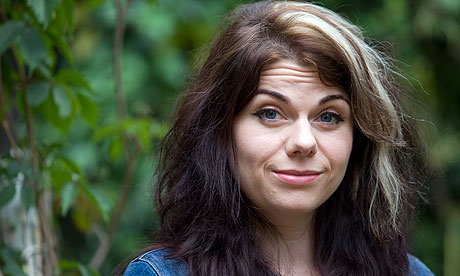Both need to go beyond the convention of what defines them and be open to new ideas, says Allison Ogden-Newton in today's Guardian Professional

Social enterprise and feminism need to go beyond the convention of what defines them and be open to new ideas Photograph: Martin Argles for the Guardian
Having read Aida Edemariam's interview with Caitlin Moran in the Guardian, Moran's new book "How to Be a Woman" sounds like essential reading, even if I think I already know how to be a woman. The timing is good as we had Sophi Tranchell, co-chair of Social Enterprise London and managing director of Divine Chocolate on Woman's Hour this week talking about the role of women in social enterprise.
Like Sophi and I, Moran calls herself a feminist and bemoans the fact that 58% of British and 71% of American women choose to not call themselves that.
Shame. She also makes the point that the feminist movement is too purist, setting hurdles to jump and traps to fall into for its prospective followers.
I have often said social enterprise reminds me of the feminist movement. I was involved in the movement as much as I am now in social enterprise - until it started to eat itself, that is. The problem was one of leadership. If the leaders and spokespeople, spokeswomen in this case, decide to define feminism as something you can only achieve if you live in a women-only commune, then most people are going to look elsewhere for moral, spiritual and political guidance.
That is why, having not yet read Moran's thesis I applaud her bring-it-on views on high heels, Brazilian waxing, men and motherhood. I love that she believes that there should be more humour, even on subjects such as abortion. The truth is that the agitation for change often comes from the energy of outrage, but is, in my opinion, only institutionalised for the benefit of all by humour, with which comes acceptance. That is why people who don't find social enterprise/feminism/you-name-it funny frighten me, and why I think those that feel they own the intellectual property or moral high ground on these issues are dangerous.
I was part of fierce rows within the sisterhood in the late 1980s about the sanctity of women-only courses, programmes, funding and housing. I believed then, and still do now, that women will always do better if they are allowed to develop their skills in women-only groups before pitting their fledgling confidence against the often male-dominated work arena. But we were not going to win. Our arguments were largely staged for one another and we didn't notice that those in charge of budgets were men who found our demands shrill and self-serving.
What we needed to do was compromise and welcome a broader spectrum of like-minded people into our world. Money was tight, the Conservatives were in power and getting people, primarily men, into work was the great national challenge. Sound familiar? Only those of a certain age will remember this, but there was a time in the 1980s when every major city in England had a women-only construction training facility (one run by me), funding streams and housing. Only a fraction of that remains, most having been 'subsumed into the mainstream' (read gone).
So what did I learn? Instead of demanding splendid segregation to spend time defining and refining purist notions of feminism (rejection of men, makeup, leghair etc), we should have taken charge of stuff and travelled with our beliefs, allowing them to be tempered with what we learnt on our journey to power about the needs of others (men, painted and smooth-legged women and the like).
If I can take lessons from Moran in how to be a woman, I can also learn from my members about what a social enterprise is. To be able to deliver public services at scale and compete with the big bad boys, social enterprises will need to attract investment as part-employee owned Circle Holdings Plc has announced this week. All definitions might and indeed should be different again tomorrow – for some Lady Gaga is redefining a highly liberated view of womanhood – these are all things that should inspire and intrigue, not threaten us.
Women, like many social entrepreneurs, are in charge of very little. Those who are seem to think that the free market, like a logger's monster truck crunching its way through the rainforest, should be allowed to follow its path unchallenged, and that anyone in receipt of public funds, be they a start-up business, an SME, infrastructure organisation or government contract deliverer, is contributing to the deficit and should learn to live without government money. If our arguments fail to be persuasive, much that is critical to the development of those who do not already dominate the market, like social enterprises, could be lost.
So let feminists wear make-up and social enterprises go where no one has gone before. You never know, we might like what we find. I like marriage and motherhood and I like taking ideas about social value and profit-making not profiteering into new territories like public services. It all feels right, whatever the purists say.
Women can paint their nails as well as walls and social enterprises can use investment capital and still be social enterprises.
Allison Ogden-Newton is the chief executive of Social Enterprise London.
This content is brought to you by Guardian Professional. To join the social enterprise network, click here.

Thanks for the comments on the Guardian site, even the patronising and ill informed one, its good to debate these issues. Lucy, I wasn't thinking of the Mark when I wrote this piece but in some ways you are right, its the same principle. My point is that our ambitions have to be to control the means of production, to quote Marx, to be in charge, and ensure our debates include and do not alienate those interested but outside our world.
ReplyDelete